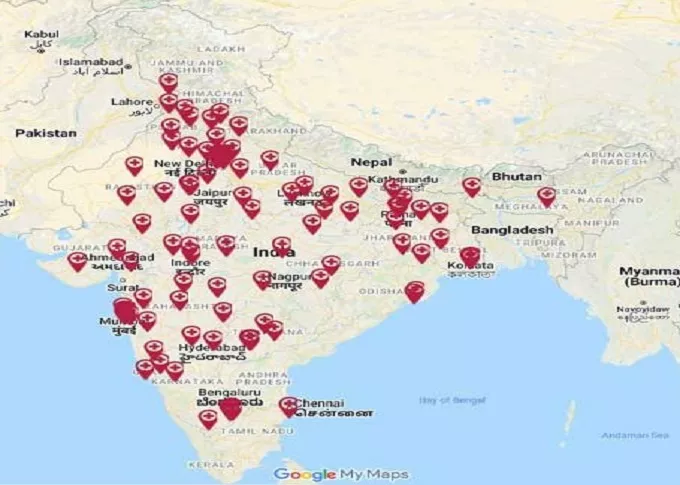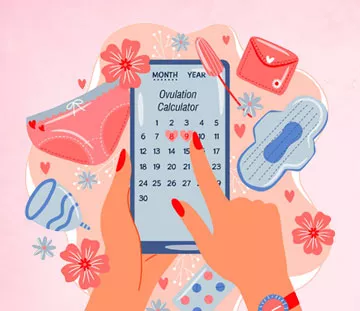What is Ovulation?
Knowing the ovulation period is important for women trying to conceive because egg fertilisation can occur within 12 to 24 hours after it is released. Since sperm can survive within the uterus for up to 5 days, having sexual intercourse before and on the day of ovulation can maximise the chances of fertilisation and, thereby, conception. If fertilisation occurs, the fertilised egg will then implant in the uterus within the next 6 to 12 days. If the egg is not fertilised within the ovulation period, menstruation occurs causing the expulsion of blood and mucosal tissue from the inner lining of the uterus.
Calculate Now!
Myth: Ovulation calculators work for all women, regardless of cycle variability.
Fact: They are less accurate for irregular cycles, as they rely on an average cycle length.

Myth: Ovulation calculators work for all women, regardless of cycle variability.
Fact: They are less accurate for irregular cycles, as they rely on an average cycle length.
How to Spot the Signs of Ovulation?
Ovulation and its signs can differ from woman to woman, but there are some common symptoms to look out for. These include:
- Change in the consistency of cervical mucus, which becomes more stretchy and clear, like an egg white
- Slight rise in basal body temperature, which stays elevated during most of the fertile days
- Nausea and headaches on the day of ovulation due to changes in the levels of oestrogen and progesterone
- Bloating
- Changes in appetite or mood
- Slight change in the position of the cervix, which becomes higher, softer, and more open
- Light brown spotting or discharge
- Soreness or tenderness of the breasts
- Increased sex drive
- Mild pain in the pelvis or lower abdomen
- Increased sensitivity to smell and taste
- Swelling of the vulva or vagina
How to Calculate My Fertile Days?
If you are wondering when your most fertile days are, an ovulation calculator is a helpful solution. It is a tool that lets you determine your expected ovulation date based on the history of your previous menstrual cycles. This calculates the probable date of your next ovulation and when you are most fertile. Every woman's menstrual cycle is unique, so knowing your fertile days can help improve your chances of conception and pregnancy.
How to Use the Ovulation Date Calculator?
The ovulation date calculator works on the information you provide regarding your last menstrual cycle. So, you must enter the first day of your last menstrual cycle and the length of your usual menstrual cycle.
The duration of the menstrual cycle is the number of days starting from the first day of your period to the day before the start of your next period. The average length of the menstrual cycle is around 28 days, however, it can be shorter or longer, varying from person to person. The ovulation period calculator usually counts 14 days backwards from the expected first day of your next period to determine your upcoming ovulation period. You can check your fertile days for the upcoming few months as well.
How Does the Menstrual Cycle Work?
A menstrual cycle begins when you begin menstruating or start having your period. This is when the lining of your uterus, which is the site of implantation after fertilisation of an egg by sperm, starts shedding. It typically lasts for an average of four weeks, but it can be shorter or longer, varying from one woman to another. Ovulation usually takes place on the 14th day of a 28-day menstrual cycle. But the ovulation period lasts longer than just one day. Four to five days before ovulation and four to five days after ovulation, i.e., two weeks within your menstrual cycle, is considered your ovulation period, which is the most fertile period for fertilisation and conception. Understanding when you are most likely to conceive during the menstrual cycle can help better your of getting pregnant.
What if the Menstrual Cycle is Irregular?
If your menstrual cycle is irregular, it may be troublesome to figure out the exact days of your ovulation based on the ovulation calculator alone. Other ways to predict your probable ovulation days include checking your basal body temperature, checking your cervix for changes, and using ovulation predictor kits. Other kinds of ovulation predictor kits use saliva or sweat to detect the level of estrogen, which changes over the course of a woman's menstrual cycle. Talk to your general physician or gynaecologist to determine which online ovulation calculator for irregular periods can be helpful for you.
When is the Best Time to Conceive?
The best time for you to conceive is during the fertile days of your ovulation period. This time frame includes the 4 to 5 days before your ovulation until the day after your ovulation occurs. Sperm can survive for a few days within a woman's body, usually up to 5 days. Therefore, having sexual intercourse in the days leading up to your ovulation day and the day after can increase your chances of conception and pregnancy significantly.
Pregnancy Calculator Tools for Confident and Stress-Free Pregnancy Planning
Get quick understanding of your fertility cycle and accordingly make a schedule to track it
Get a free consultation!




 Prev
Prev









